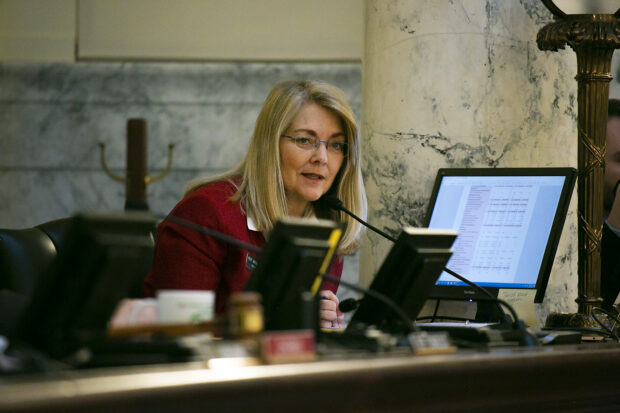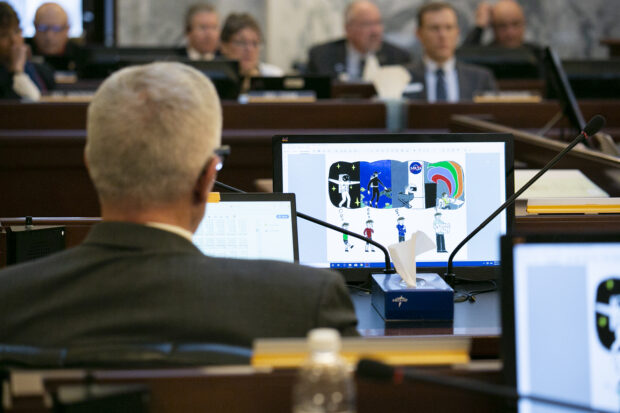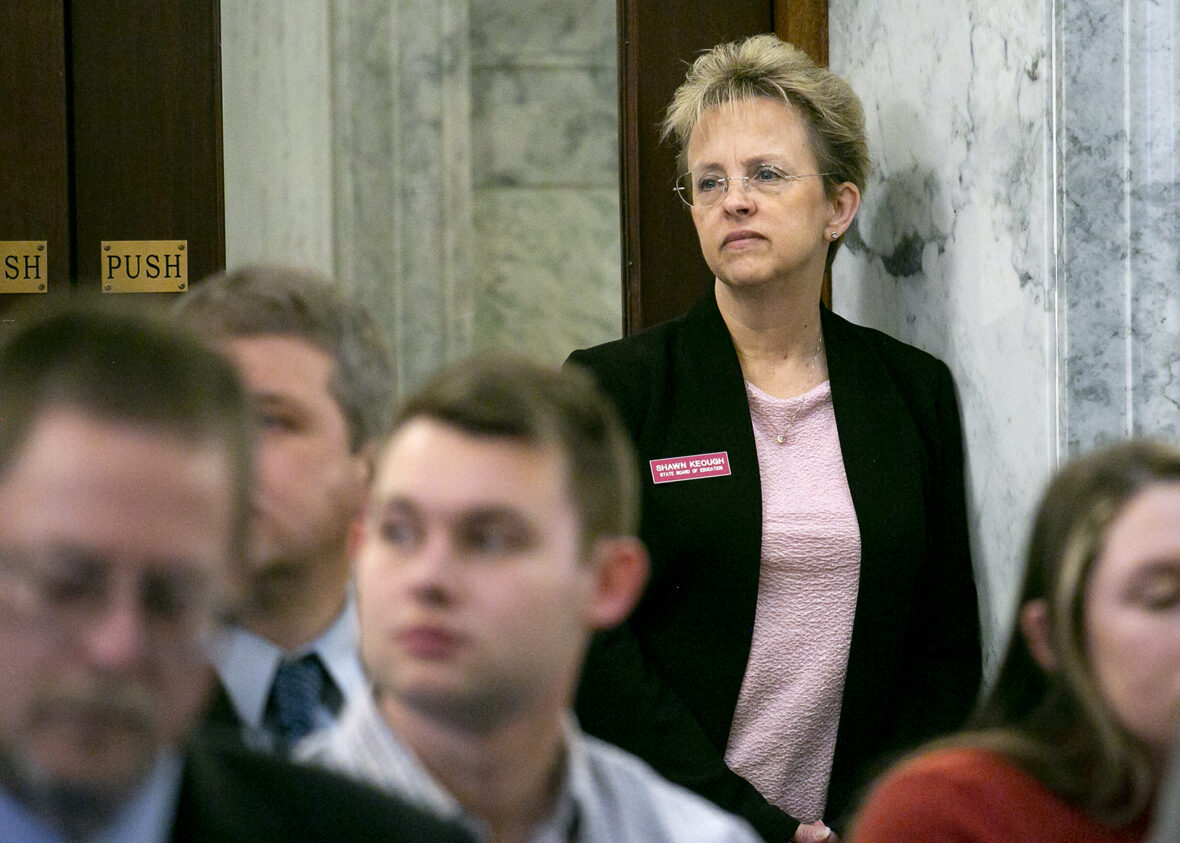Using her experience on Gov. Brad Little’s K-12 task force as a guide, schools chief Sherri Ybarra Thursday made her formal request to the Legislature to increase public school funding by $101 million next year.
Ybarra, a Mountain Home Republican, spent one hour and 40 minutes guiding the Legislature’s Joint Finance-Appropriations Committee through her 2020-21 K-12 budget request.
“Our investment in education is an investment in our children, who are Idaho’s future,” Ybarra said.
The details and the dollars weren’t a surprise because Ybarra released her budget request in September.
All told, Ybarra is seeking nearly $2 billion in general fund spending for public schools next year, a 5.3 percent increase.
In alignment with the “Our Kids, Idaho’s Future” task force and Little’s top priority, Ybarra is building her budget around increasing pay for veteran teachers. She wants to work toward a 2013 task force’s recommendation to have teacher salary bases of $40,000, $50,000 and $60,000, noting that it will take incremental progress over the next few years to get there.
“Human capital is our most important asset,” Ybarra said. “As usual, the largest increase in my budget is for salaries for teachers and pupil-services staff.”
Highlights of Ybarra’s budget proposal include:
- $40 million in new funding for raises for veteran teachers.
- $17.3 million to increase discretionary funding to pay for health-care costs and general operations. Under such a move, Ybarra would increase per-classroom funding (referred to as funding per support unit in budget lingo) from $15,601 to $15,786.
- $3.1 million in new funding to make the $26 million literacy initiative an annual, ongoing program.
- $2 million in new funding for advanced opportunities.
- $1 million in new funding to provide resources and support for students social-emotional learning needs.
- $500,000 to increase funding for the master education program.
There are a few differences between Ybarra and Little’s budget requests. Overall, Little is seeking a 4.1 percent funding increase. Little asked for $10 million less for veteran teacher salaries. Additionally, Little is not seeking to increase funding per classroom, although his budget projects the number of classrooms to increase at the same rate as Ybarra’s budget does.

House Vice Chairwoman Wendy Horman, R-Idaho Falls, called Thursday’s budget hearing “a good conversation.”
But now Horman said she will want the details about how the budget numbers align with policy. It will be up to the House and Senate education committees to take the lead on what those policies look like — in areas such as teacher pay raises and tying raises to student performance.
“(There’s) lots of work still to do, and waiting,” Horman said.
Co-Chairman Steve Bair, R-Blackfoot, thanked Ybarra for a detailed budget filled with “lots of facts, lots of figures, lots of numbers.”
Despite a positive reception in JFAC, Ybarra — and Little, who wasn’t present — received several questions from legislative budget writers.
Horman expressed concern with pulling about $32 million out of the Public Education Stabilization Fund (PESF) to cover unexpected costs. Horman has previously suggested such a large withdrawal from savings is unsustainable. On Thursday, she requested a district-by-district breakdown of transportation costs — one factor in the withdrawal, along with advanced opportunities programs. Horman also requested detailed information about school district and charter school reserve fund balances, which Idaho Education News reported on in detail Thursday.

Sen. Jeff Agenbroad, R-Nampa, expressed concern with the $4,125 that the state makes available to all secondary students for advanced opportunities, such as dual credit programs. Ybarra is seeking a $2 million increase next year for advanced opportunities.
But Agenbroad pointed out that only a fraction of students tap into the $4,125. Agenbroad and Sen. Jim Woodward, R-Sagle, told Idaho Education News during a break in the hearing that they are worried what will happen to the budget as more students take advantage of advanced opportunities. They also expressed concern with how the program affects Idaho’s colleges and universities, which subsidize the course offerings.
“Sometimes a great idea’s success can be its downfall,” Agenbroad said. “The last thing I want is for this to become a downfall.”
Ybarra said she and her team shares concerns about drawing down savings accounts. But she also said the program allows high school students to save money by jumpstarting their postsecondary education.
“I think the savings to the student is what we really need to be focusing on,” Ybarra said.
Thursday was Ybarra’s time to officially present her budget proposal. Next month, JFAC will transition from budget hearings to writing the state budget.
Legislators have increased K-12 spending by at least $100 million each year for the past five years. K-12 education funding accounts for about half of Idaho’s general fund spending. Once JFAC sets the 2020-21 budget, it will become clear what percentage of next year’s budget will be directed to public schools.
Public school spending is Idaho’s largest expense each year, which is why Ybarra’s budget hearings are closely scrutinized by legislators, taxpayers, educators and the news media.
More reading: Veteran teacher pay raises will likely hing on an accountability metric.

Keough confirmed to State Board
With little discussion, and no opposition, the Senate quickly confirmed Shawn Keough’s appointment to the State Board of Education Thursday.
Keough’s confirmation was never in doubt. Keough became the longest-serving woman in the history of the Idaho Senate before she retired in 2018 after 22 years in office. She was a powerful and respected legislator who served as co-chair of JFAC.
Keough is “perfectly suited in skills, knowledge and motivation” for the State Board assignment, Woodward said.
Sen. Todd Lakey, R-Nampa, called Keough “one of my mentors and my role model.”
Keough will serve a five-year term on the policy-setting State Board. Keough was one of two State Board appointments Little made in 2019. He also appointed Boise businessman Kurt Liebich in December. Liebich’s appointment is also subject to Senate confirmation, but does not need to be handled at the same time as Keough’s.
